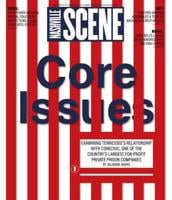In order to communicate a defining experience, a film needs to engage the eye, the ear, the heart, the body. It needs to move the viewer in more ways than one. Director Bassam Tariq’s debut feature Mogul Mowgli accomplishes this, and does so to such an impressive degree that viewing it is an often uncomfortable experience. And why shouldn’t a story like this one — of a British-Pakistani rapper about to make it big but forced to let his dream go due to a degenerative illness — be uncomfortable?
That log line probably sounds somewhat familiar if you’ve seen 2020’s Sound of Metal, which — like Mowgli — stars Riz Ahmed. That film earned Ahmed an Oscar nomination for Best Actor, and saw him playing a musician whose career is halted after he loses his hearing. But Mogul Mowgli, which Ahmed co-wrote with Tariq, hums on an entirely other wavelength, right down to its stifling 4:3 aspect ratio. It feels like a fever dream, yanking Ahmed’s Zed from present to past to nightmares to hallucinations as he attempts to cope with his diagnosis and accept that his career has stopped short after 15 years of hustle and traveling to the U.S., away from his family in the U.K.
Zed’s diagnosis — of an autoimmune disease that sees him progressively lose feeling in his legs — comes just as he heads home to visit his family. We quickly see that the chasm between Zed and his parents, Bashir (Alyy Khan) and Nasra (Sudha Bhuchar), has been growing while he’s been away. It’s a space likely familiar to many children of immigrants attempting to reconcile our parents’ experiences and expectations with our own in a culture so different from theirs.
Such is the case with Zed — or rather, Zaheer — who chose a new moniker in his new home. “They gave us our names,” his brother bitterly reminds him as they discuss choosing “whiter” names for their future children to make their paths easier in life. It’s one of the many scenes that held up a mirror for me: My own name has never been pronounced the way it’s meant to be by those around me. While I was growing up, people often didn’t want to learn how to say my name, and they struggled to do so, rarely without laughter. If it was easier for them to butcher my name — to colonize it — then it was easier for me, I decided; one small and lasting surrender. Now that I’m in my 30s, this has come to illustrate a key part of my Pakistani and Western identity, even as I’ve grown prouder of the former, and more critical of the latter.
That’s a lifelong journey, and one that Mogul Mowgli tackles with connective threads: assimilation, appropriation, generational trauma. This struggle with identity is there in the ways Zed and his cousins look for excuses to avoid roza (fasting), the way they fear their two-faced aunties, the way they roll their eyes at their parents’ superstitions, the way Zed fumbles while praying at the mosque. Minute and major, these struggles inspire shame, confusion, regret.
Zed is forced to confront his relationship with his father, whose memories of fleeing from India to Pakistan by train during 1947’s Partition color the film. He and Nasra have a deep need to take care of Zed, who couldn’t care less about their history and spends his days self-soothing by free-styling lyrics about identity rather than actually exploring it. But ultimately it’s his father’s touch as he bathes Zed and helps him off the toilet seat that soothes him. The necessary tenderness is mutual, and reminded me of when I moved away from home and my mother longed to find ways to be needed by me. Like Zed, I resented it at first — why couldn’t she see that I could take care of myself? But today, I can say, “Can you show me how to cook this? I have a headache; do you have any remedies? I need new towels, what do you recommend?” For my mom, for Bashir and Nasra, this is healing. For myself and Zed, this is validation.
Ahmed himself is a British-Pakistani rapper, and he turns in a pulsating and vulnerable performance. Meanwhile, Tariq explores the spirit’s liminal spaces. Despite Zed spending much of the film in a chair or a hospital bed, Mogul Mowgli moves in provocative ways — most especially in the form of a foreboding figure who appears in the edges of Zed’s visions and dreams and calls himself “Toba Tek Singh!” Wearing a sehra (a kind of headdress worn by South Asian grooms at their weddings), he is a reminder of the culture gap weighing heavy on Zed during his time at home. To truly parse the significance of this character, it’s worth reading beloved Pakistani writer Saadat Hasan Manto — who my mother taught me about a year ago, while expressing concern over just how all-consuming a writer’s vocation can become — and his 1955 short story “Toba Tek Singh.”
Mogul Mowgli opts for a whole lot of metaphor, and that isn’t a bad thing. When you explore your identity, your past, your family, it isn’t ever straight and simple in your head — why should it be in a cinematic excavation?





